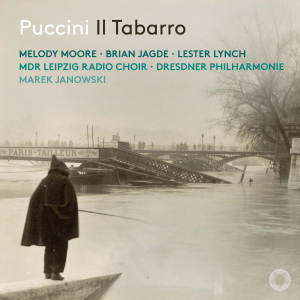During the 1880s and 1890s, Italian publishers were making a concerted effort to find a successor to Giuseppe Verdi who, however, remained a towering force in Italian operatic life. The major publishing house of Ricordi supported several younger composers, notable amongst whom was Giacomo Puccini, but his first two operas Le Villi (1884) and Edgar (1889) failed to make a strong impression, and it was Ricordi’s rivals, Sonzogno, which seemed to have the biggest success. As a result of Sonzogno’s one-act opera competitions, Mascagni’s Cavalleria rusticana ushered in a new style, Verismo, and the success of Leoncavallo’s Pagliacci seemed to confirm this new style.
Puccini viewed Leoncavallo and Mascagni’s success enviously, but when he did reach the heights with La bohème in 1896, it was not quite in the verismo vein. Whilst Puccini would use elements of this new style, with dramatic plots, melodramatic effects, an emphasis on through-composed dialogue, fast pacing, and big soaring melodies, he would also learn lessons from composers like Massenet and thread his orchestral writing with leitmotifs which brought a richness and complexity to the scores.

By 1904, Puccini had the idea for three one-act operas (perhaps inspired by the success of Cavalleria rusticana and Pagliacci as a double bill), but his publishers were not keen, partly because of the expense of staging three operas and partly because the genre was inextricably linked to rivals Sonzogno and their competitions.
When Giulio Ricordi died in 1912, Puccini managed to get his way and Il trittico premiered in 1918, three contrasting operas, one melodramatic with gritty realism, Il tabarro, one sentimental and religious, Suor Angelica, and one comic, Gianni Schicchi. For Il tabarro, Puccini looked back to Verismo, which by the 1910s was something of a past phase, none of the Verismo composers from the 1890s was writing in the style. But Puccini wrapped this Veristic style in his technique, to create a deceptively complex work.
For years, the only way to see Il tabarro was in tandem with one or all of the operas from Il trittico but now have learned to love it for its own sake. This new recording of Puccini’s Il tabarro from Pentatone features Marek Janowski conducting the Dresdner Philharmonie (of which he is the chief conductor), with Melody Moore, Brian Jagde and Lester Lynch. The set is a follow up to the same team’s recording of Mascagni’s Cavalleria Rusticana which was released on Pentatone last year.
For Il tabarro, Puccini weaves his orchestra and his chorus and subsidiary roles into richly complex tapestry against which the drama is played out. Janowski and his orchestra evoke this wonderfully in the opening prelude, but from the first, there was a sense that this was too relaxed.
Melody Moore makes Giorgetta young and anxious, singing with a lovely well-modulated voice and bringing some touching moments, but she only rarely catches full fire. Perhaps it does not help that Brian Jade’s Luigi is firm and steady, without a feeling of youthful impulse in his voice. He and Moore sing well together, but they don’t make sparks fly. Similarly, the scene between them and Lester Lynch’s Michele never seems to have the underlying tension needed.
The booklet’s article is titled Murderous Passion, but here things feel too relaxed, there is never the danger that passions will boil over. IltTabarro needs to simmer gradually and inexorably to boiling point, and this just doesn’t quite. Lester Lynch’s Michele has his moments, and like Moore is often rather moving but there is little sense of danger. It all feels a little too sensible.
The character roles are strongly etched, and I particularly loved Roxana Constantinescu and Martin-Jan Nijhof’s final exit duet as La Frugola and Talpa. The MDR Leipzig Radio Chorus makes a small but strong contribution.
Whilst the orchestra plays finely for Marek Janowski, making a strong contribution to the recording, overall I found Janowski’s approach to tempos rather too steady, too sensible. Too often, I felt the drama lacked the sense of impetus, of the unexpected. Puccini’s music pays close attention to the ebb and flow of words, and I felt that Janowski was too inclined to let the drama move along steadily.
The two main contenders for a recommendation for a recording of Il tabarro are generally available as part of a complete set of Il trittico – Tullio Serafin’s complete Il trittico with Tito Gobbi in thrilling form as Michele, and for modern sound, Antonio Pappano’s recording of Il trittico on Warner Classics is highly recommendable.
Whilst a new studio recording is always highly welcome in this straitened era and there is much that is admirable about this new disc, for me this performance just does not quite catch fire. Puccini’s melodrama lacks that element of fire and temperament which is essential.
Robert Hugill
Puccini: Il tabarro
Giorgetta – Melody Moore, Michele – Lester Lynch, Luigi – Brian Jagde, Song Seller – Khanyiso Gwenxane, La Frugola – Roxana Constantinescu, Tinca – Simeon Esper, Talpa – Martin-Jan Nijhoff, Lovers – Joanna Marie D’Mello, Yongkeun Kim; Conductor – Marek Janowski, Dresdner Philharmonie, MDR Leipzig Radio Choir.
PENTATONE PTC 5186 773 [49:54]
ABOVE: Marek Janowski (c) Felix Broede